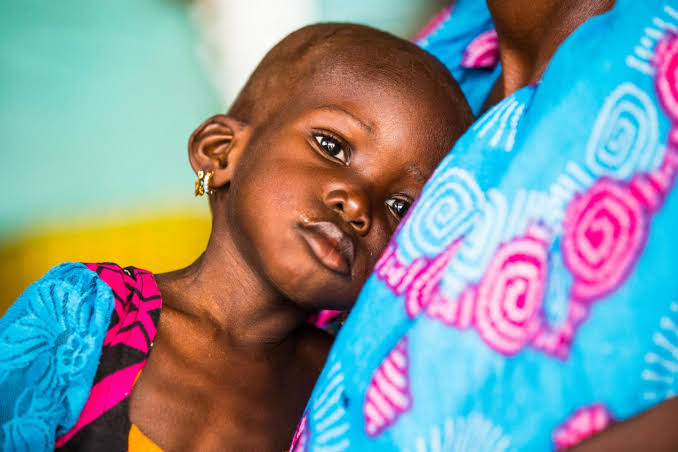The United Nations Children’s Fund (UNICEF) has issued an alert regarding the rising malnutrition crisis in northeast Nigeria, saying that millions of children are at danger of severe acute malnutrition.
Dr Tushar Rane, Chief of Field Office, UNICEF, spoke at a media dialogue on Child Malnutrition Media Dialogue and Capacity Building for Journalists to commemorate World Humanitarian Day in Maiduguri, Borno State, and revealed that approximately 2.8 million children under the age of five and pregnant women in Borno, Yobe, and Adamawa states are in urgent need of nutrition services.
According to the 2023 lean season Nutrition and Food Security Surveillance (NFSS), the prevalence of global acute malnutrition (GAM) among children under five is 10.2% in Borno, 8.0% in Yobe, and 4.0% in Adamawa.
Rane stated that UNICEF, in collaboration with government agencies and NGOs, has been working tirelessly to address the problem.
He stated that by 2023, they will have treated over 460,000 children with acute malnutrition and introduced innovative programs such as family screening and the Child Nutrition Fund.

He stated: “In addition to assisting CNMs and providing nutrition supplies to 765 OTPs and 50 SCs in northeast Nigeria, UNICEF has been assisting the government in piloting a few holistic projects to combat child malnutrition.
“To identify children with SAM, UNICEF and the Borno State Primary Health Care Board are using a proactive screening method across the BAY states. “In northeast Nigeria, the family approach to malnutrition screening has enabled more than 100,000 carers to screen and identify children with acute malnutrition.”
“Mothers have an important role in promoting their children’s health so that they can grow and develop properly.
“The aim of the family screening approach is to shorten the identification, referral and treatment gap and also train carers to provide household screening for their children, using the Mid-Upper Arm Circumference (MUAC) tape
“Despite these achievements, he emphasised the need for additional investment in nutrition programs as well as better government support. He said that the family initiative was already generating results, stating that in Banki, a community in Borno State, more than one in every four children (30%) undergoing acute malnutrition treatment are discovered using the family screening approach.
The UNICEF director-general urged increased integration of health, water, sanitation, food security, education, and child protection services to provide comprehensive solutions.
“Prevention comes first,” Rane explained.”We must focus on preventing malnutrition through early identification,treatment, and community-based interventions.”
He also encouraged the government to increase funding for nutrition programs, ensure regular monitoring of the nutrition situation, and promote community participation in tackling the crisis.
He revealed that UNICEF has established the Child Nutrition Fund (CNF) with the government in the northeast and has inked Memoranda of Understanding (MoUs) with them. He explained that the CNF is an alternate finance instrument for combating childhood malnutrition.
According to Rane, the MoU would address malnutrition among children under the age of five, as well as pregnant and lactating women, by providing Ready-to-Use Therapeutic Food (RUTF).
The primary beneficiaries will be children aged 0 to 59 months, as well as pregnant and lactating/breastfeeding mothers.
The Borno State Government has committed $100,000 in counterpart funding to match UNICEF’s contribution to the purse. UNICEF is optimistic about the impact of domestic financing to address child wasting and improve the well-being of conflict-affected children, given that the Adamawa government has also signed the CNF MoU.
In Essence
UNICEF’s warning about the rising malnutrition crisis in northeast Nigeria is a stark reminder of the ongoing humanitarian challenges in the region.
The alarming statistics, with millions of children and pregnant women at risk of severe acute malnutrition, underscore the severity of the situation.
The crisis in the northeast is compounded by a combination of factors, including protracted conflict, displacement, poor healthcare infrastructure, and food insecurity.
The prevalence of Global Acute Malnutrition (GAM) reported in Borno, Yobe, and Adamawa states is a clear indicator that the situation is deteriorating and requires urgent, sustained intervention.

















